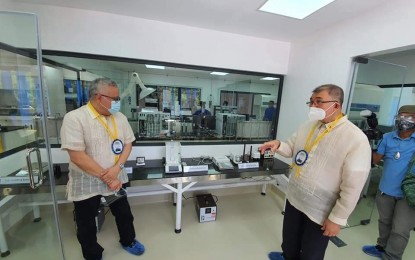
MIC LAB. Trade and Industry Secretary Ramon Lopez and DOST Secretary Fortunato de la Peña inspect the Metrology in Chemistry (MiC) laboratory in Bicutan, Taguig City on Tuesday (Nov. 9, 2021). The four-story facility is equipped with machines, devices, and advanced instruments for reference materials production for local food manufacturers and water processors. (Photo courtesy of DOST Undersecretary Rowena Guevara)
MANILA – A four-story Metrology in Chemistry (MiC) laboratory was launched on Tuesday at the Department of Science and Technology (DOST) Compound in Bicutan, Taguig City.
It is equipped with machines, devices, and advanced instruments for reference materials production for local food manufacturers and water processors.
"We want to ensure that MiC's technological features have room to infrastructurally expand as it aims for increasingly accurate and reliable chemical measurements by laboratories in the Philippines," DOST Secretary Fortunato de la Peña said during the launch.
Having this laboratory is part of the DOST's commitment to assist local industry sectors in ensuring that the goods and services they deliver are of the highest quality.
In 2019, the DOST also launched the National Metrology Laboratory (NML) at its compound. Both laboratories are open to the public.
"The one launched in 2019 is for lengths, weights, and volumes. Later, we will launch a Metrology laboratory for Biology," de la Peña told the Philippine News Agency.
Establishing the MiC, he said, also aims to stop and prevent massive product recalls.
"Product recalls pose significant economic burdens. When these recalls are traced, for example, to high histamine levels (a chemical indication of food spoilage) in canned tuna, a public health scare can lead to epidemiological tracking of determinants of the disease conditions," de la Peña said.
Such instances are time-consuming, expensive, and damaging to the canned tuna manufacturer, he added. "When the scare happens overseas (involving a) Philippine product, it does not only mean 'refused entry'. It can also put the country in the barred list of exporters of unsafe products," he said.
From producing traceable reference materials (RMs) for drinking water analysis, the MiC laboratory is also making RMs for fruits, vegetables, and seafood. These RMs are distributed free of charge nationwide to different public and private chemical testing laboratories for measurement and quality control schemes and proficiency testing programs.
De la Peña said most Philippine food manufacturers currently rely on RMs purchased overseas. These RMs may cost from PHP15,000 to PHP30,000.
"By establishing the MiC laboratory, we tell the international export community that Philippine products are as good as any of its European, American, British, Chinese, or Thai counterparts," he said. (PNA)
It is equipped with machines, devices, and advanced instruments for reference materials production for local food manufacturers and water processors.
"We want to ensure that MiC's technological features have room to infrastructurally expand as it aims for increasingly accurate and reliable chemical measurements by laboratories in the Philippines," DOST Secretary Fortunato de la Peña said during the launch.
Having this laboratory is part of the DOST's commitment to assist local industry sectors in ensuring that the goods and services they deliver are of the highest quality.
In 2019, the DOST also launched the National Metrology Laboratory (NML) at its compound. Both laboratories are open to the public.
"The one launched in 2019 is for lengths, weights, and volumes. Later, we will launch a Metrology laboratory for Biology," de la Peña told the Philippine News Agency.
Establishing the MiC, he said, also aims to stop and prevent massive product recalls.
"Product recalls pose significant economic burdens. When these recalls are traced, for example, to high histamine levels (a chemical indication of food spoilage) in canned tuna, a public health scare can lead to epidemiological tracking of determinants of the disease conditions," de la Peña said.
Such instances are time-consuming, expensive, and damaging to the canned tuna manufacturer, he added. "When the scare happens overseas (involving a) Philippine product, it does not only mean 'refused entry'. It can also put the country in the barred list of exporters of unsafe products," he said.
From producing traceable reference materials (RMs) for drinking water analysis, the MiC laboratory is also making RMs for fruits, vegetables, and seafood. These RMs are distributed free of charge nationwide to different public and private chemical testing laboratories for measurement and quality control schemes and proficiency testing programs.
De la Peña said most Philippine food manufacturers currently rely on RMs purchased overseas. These RMs may cost from PHP15,000 to PHP30,000.
"By establishing the MiC laboratory, we tell the international export community that Philippine products are as good as any of its European, American, British, Chinese, or Thai counterparts," he said. (PNA)
